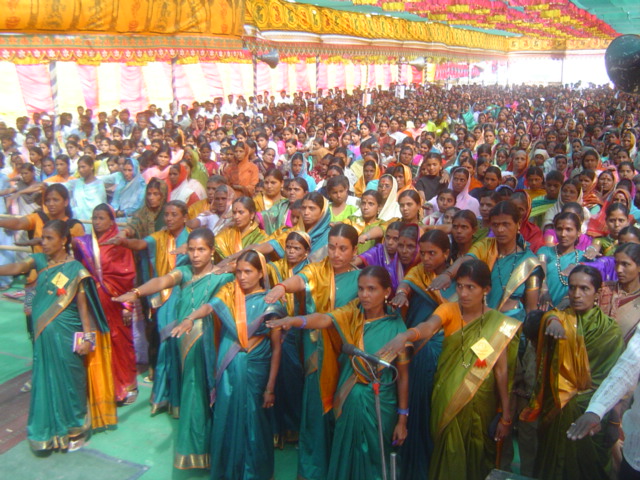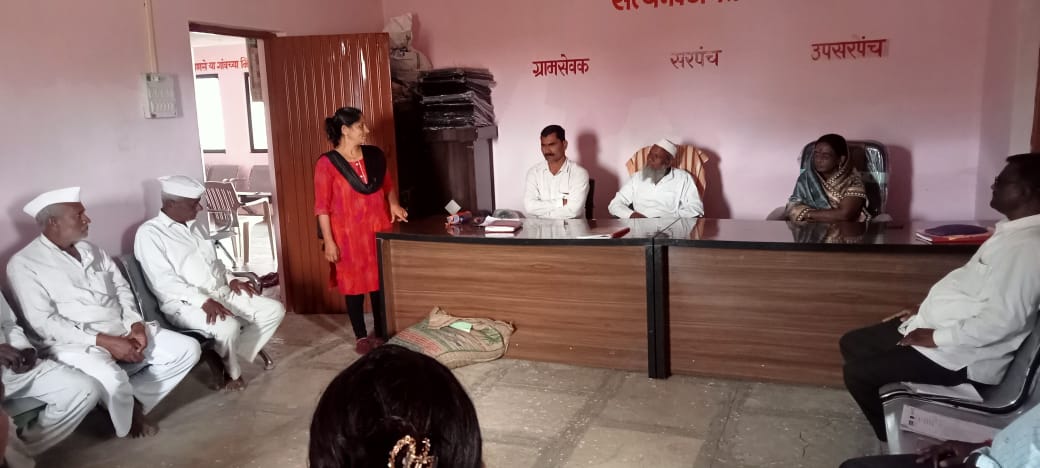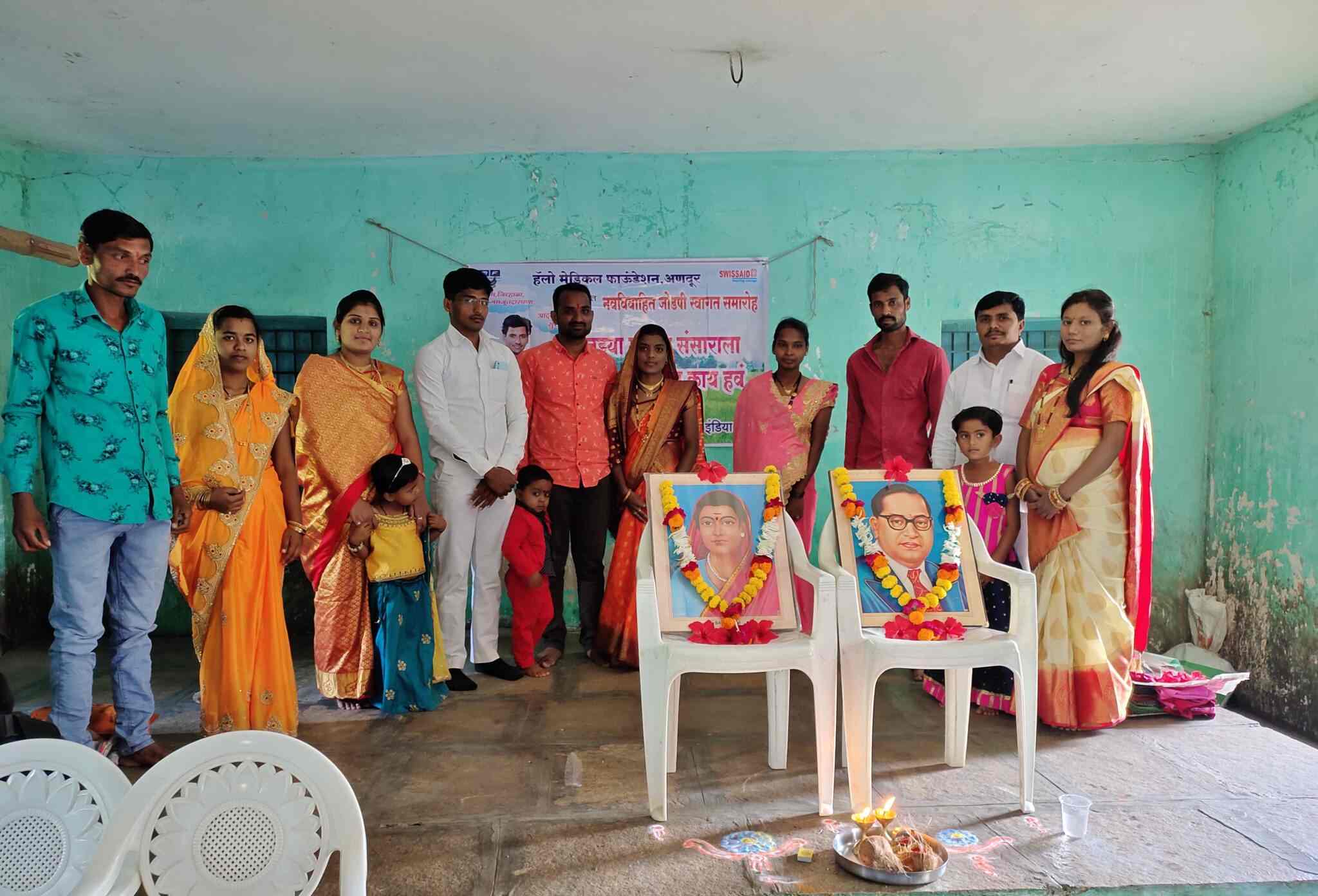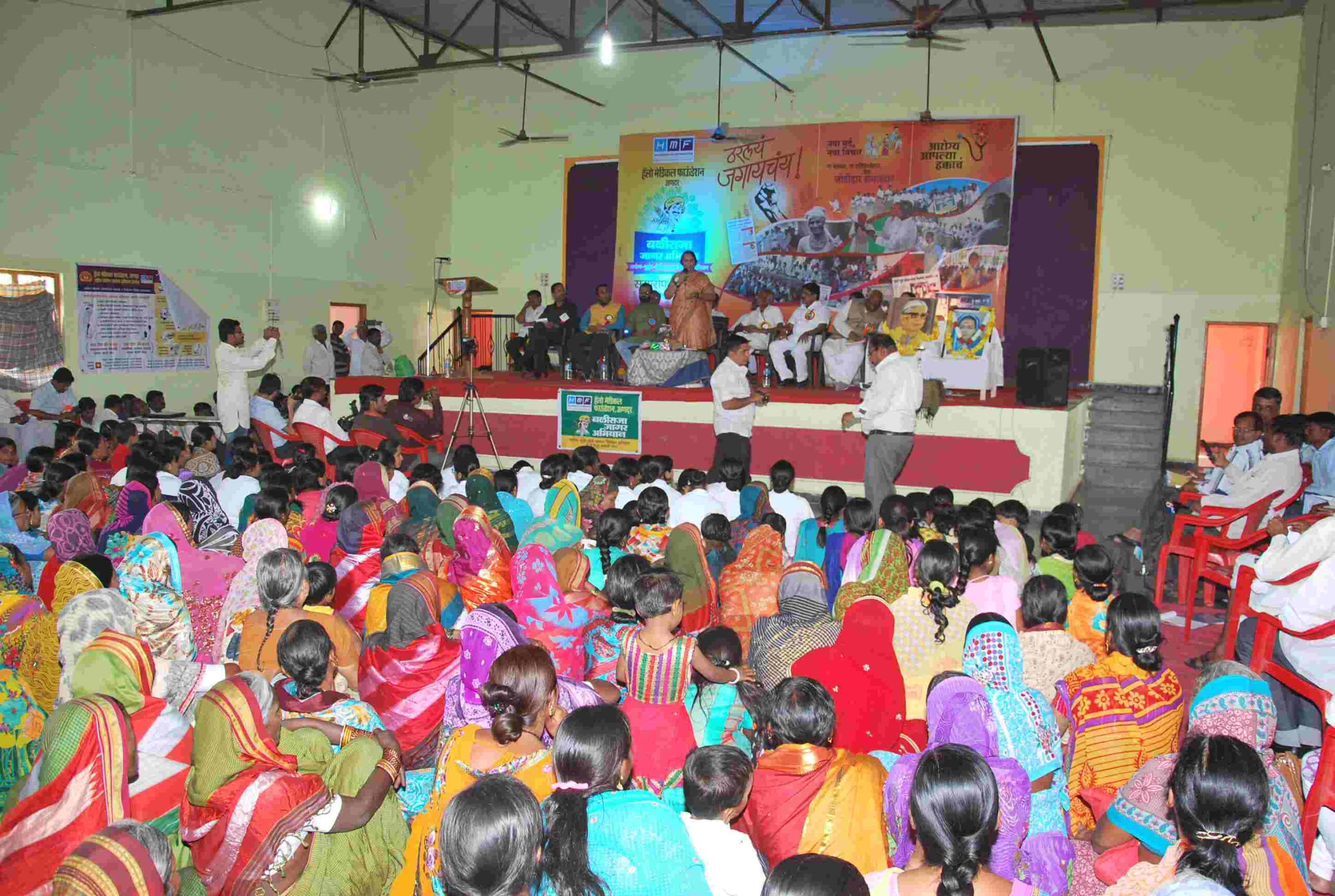Experience in empowering women in SHGs during the first decade of HMF’s intervention paved way for stepping up the intervention in the next decade (2007-2017) beyond just financial activities of savings, credit, and micro-enterprise development. Efforts extended to strengthening the SHG network for collective action, particularly addressing issues within the Public Distribution System (PDS) and enhancing women’s involvement in local governance.

From SHG Empowerment to Collective Action: Uniting Men, Women, and Stakeholders Against Gender Based Violence
Phase one (Jan. 2007 - Dec. 2008):
Phase one (Jan. 2007 – Dec. 2008) emphasised on strengthening SHGs to give voice to gender concerns and other issue
Capacity building of women in Bachat gats (SHGs) for Savings, Credit activities, Micro-enterprise development
Strengthen SHG network for collective action on PDS - Public Distribution System (food-grains distribution) issued at village level
Increase women's participation in Local governance and politics
Reach:
30 villages in Tuljapur and Lohara blocks of Dharashiv (previously Osmanabad) district.
Financial partner:
Department for International Development (DFID), UK
Phase two (Jan. 2009 - Dec. 2011)
Phase two (Jan. 2009 – Dec. 2011) emphasized strengthening SHG network to improve maternal and newborn healthcare outcomes
Strengthen SHG network for Improving maternal and newborn healthcare outcomes
Reach:
80 underserved communities in the Solapur city.
Financial partner:
This work was a part of the ‘Sure Start’ project in Solapur city funded by PATH, USA
Phase three (Jan. 2012 –Dec. 2013)
Phase three emphasized on an inclusive effort of men, women and stakeholders to address concerns of violence against women

Training SHGs to voice and address gender concerns like violence against women and discrimination
Building a network of men and women to prevent VAW - violence against women
Training programs on gender and violence for lawyers, men's groups, and government officials
Reach:
30 villages in Tuljapur and Lohara blocks of Dharashiv (previously Osmanabad) district.
Financial partner:
Supported through HMF’s own funds.
Using the experiences and lessons learnt from the Samajdaar Jodidar Project implemented in 2012 – 2013, work with men continued in the 40 project villages in the Tuljapur and Lohara Blocks in the Dharashiv District during Phase four and Phase five of HMF’s Mahila Shakti Initiative.
Phase four (Feb. 01.02.2014 – 31.01.2016)
Phase four focus: on preventing domestic violence (DV) through:

Focussed intervention in 40 selected villages in the Dharashiv (previously Osmanabad) district
Capacity building of representatives of 150 SHGs for addressing DV issues
Training lawyers and government officials on Gender and DV Act
Establishing and strengthening a cadre of 20 male animators*. (* ‘Animators’ are village youth who would themselves adopt gender-equitable practices in their personal lives and also act as ambassadors of gender equality and women’s empowerment.)
Establishing and capacity building of youth/men’s groups to address DV issue
Gender training for newly married couples
Training of members of 40 ‘Dispute Resolution Committees’ (Tanta Mukta Samiti) in villages on gender sensitization and domestic violence issues.
Supported by:
SWISSAID India, under its project titled “Women’s Empowerment, Osmanabad (now Dharashiv), Maharashtra, Phase IV”
The phase five (01.02.2016 - 13.12.2017) :
Phase five aimed to: Reduce domestic violence against women and create domestic-violence-free villages though:
- Focussed intervention in 40 selected villages in Dharashiv (previously Osmanabad) district.
- Increased men’s involvement in the mission; cadre of male animators as gender trainers create men’s groups advocating for gender equality:
- 63 young boys and men participated in training programmes.
- 4 advance training programmes were conducted for 30 male animators to animators on sexuality, masculinity and violence.
- Men for Gender Equality Campaign: Village level campaigns in 40 villages saw participation of 1067 men.
- Creating and capacity building of community support groups as first port of call for DV survivors:
- 343 women members participated in 8 training programs, 70 women in exposure visits to Police station and Protection Officer’s office
- 45 members visited Snehalaya, a social organization running a shelter home and a vocational training centre in Ahmednagar district of Maharashtra.
- ‘Committed Citizens Groups’ consisting of sensitized and influential village men and women called as ‘Nirdhaar Gat’ were formed in 37 villages to address domestic violence and promote gender equality.
- Gatherings of women survivors of violence: two gatherings for violence survivors and single were conducted in which 410 women participated
- Working with service providers under the Domestic Violence Act and government machinery for coordinated response to DV survivors:
- In the four gender and DV training programmes conducted for the Tanta Mukta Samiti (Dispute Resolution Committees) across 40 villages, 245 office bearers and members participated.
- A district-level workshop was conducted in which 148 persons, including police, lawyers, officials of the Women and Child Development department, government health officers etc. participated for advocating the activation of ‘District Monitoring Committees’ under DV Act
- A workshop of representatives from all the government departments was conducted in collaboration with women and child department.
- Gender sensitization programmes for newly married couples (Samajdaar jodidaar) saw participation of 558 newly married couples from 40 project villages.
Supported by:
SWISSAID India under its project titled “Campaign for gender sensitization of men and reducing violence against women in Maharashtra.” It was referred to by HMF workers as the “Samajdaar Jodidaar Prakalp’ in Marathi – meaning ‘Responsible Partnership Project’.
Outcome of the five phased Mahila Shakti Programme
- The perspective of the project communities about domestic violence has changed to some extent.
- They no longer consider it as a private affair, they are coming forward willingly to help the women survivors of violence.
- The support of psycho-social and legal counselling has become accessible to the women survivors of violence from the project villages.
- ‘Nirdhar Gat’ or ‘Committed Citizens Groups’ were established in 37 villages through which communities took ownership of gender equality promotion and domestic violence prevention work. These groups were created to ensure sustainability, after which HMF moved out of the village.
